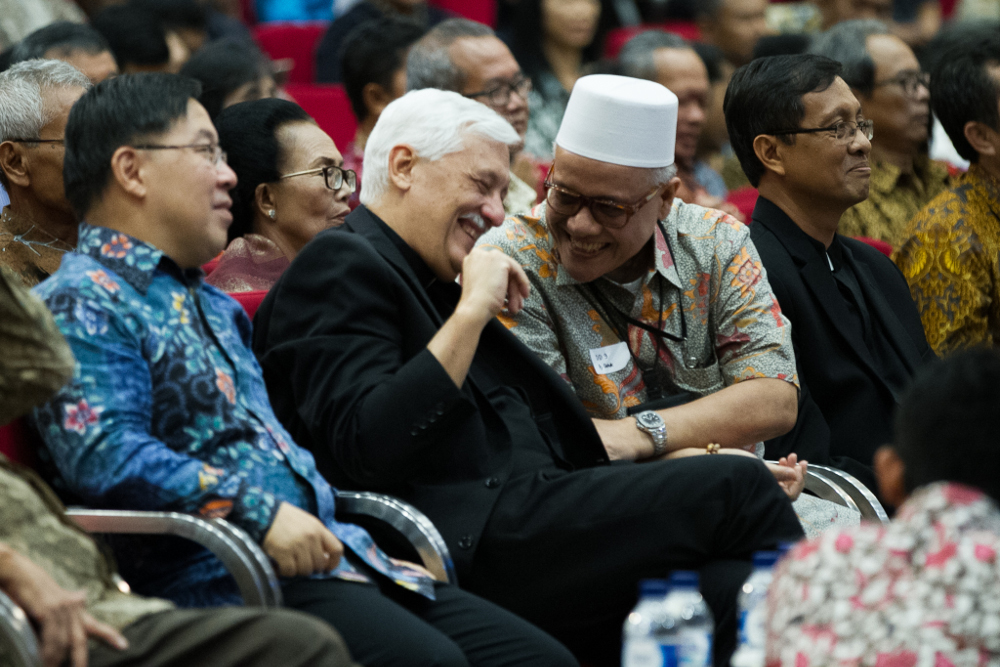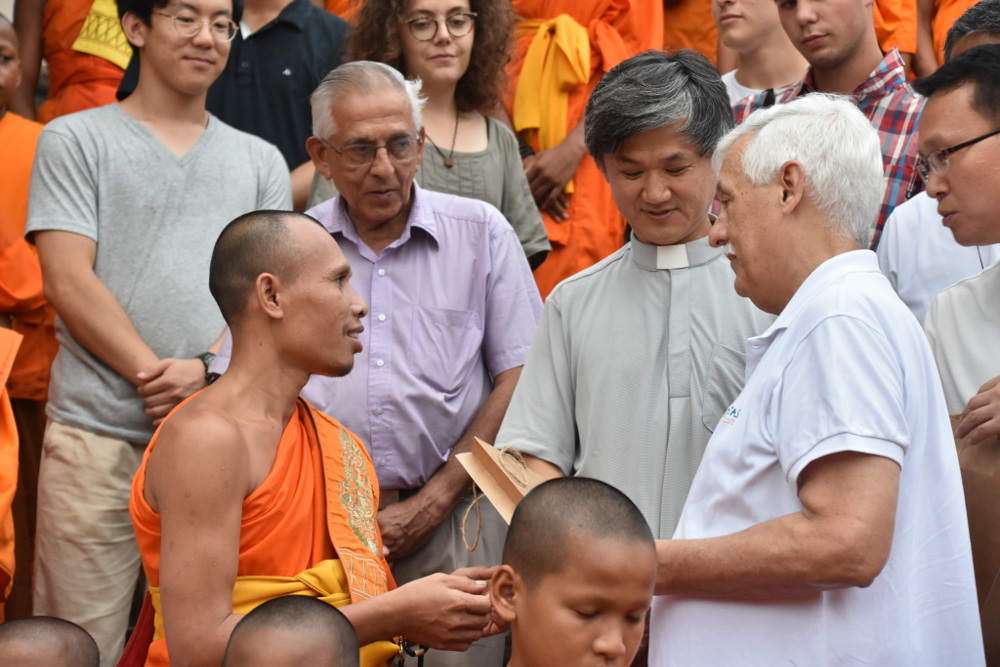Fr General Arturo Sosa SJ referred to himself as a pilgrim when he visited the Jesuit Conference of Asia Pacific last year. “St Ignatius used to call himself ‘the pilgrim,’ someone actively searching for the will of God. I would like to use that word for myself and for all of us too. I come here as a pilgrim among my fellow pilgrims, not as an expert with all the answers,” he said to lay Catholics in Jakarta, Indonesia in July. It was his first time here and he admitted humbly that he had come to Asia to learn. “Looking from the West you have the image that Asia is all the same but it is very obvious when you are here that there are so many cultures, so many ways of living life, so many traditions. It is a real richness for humanity.”
Fr General had a week-long experience of this richness of cultures and religions when he visited Indonesia, the world’s most populous Muslim nation, and Cambodia, a country that is predominantly Buddhist. He also saw some of what the Jesuit mission is in two very different Jesuit units. Indonesia is the largest province in JCAP with more than 300 Jesuits, and Cambodia is but a mission.
When he met with Jesuit scholastics in Indonesia, Fr General told them to be “authentic according to their own cultures so that they can respect and connect to other cultures”. Although formation in the Society is individual and personal, it invites Jesuits in formation to be inclusive. The scholastics shared with Fr General how their Jesuit formation has helped them to be authentic since “human freedom” has played an important role in the process.
This same spirit of openness characterised Fr Sosa’s dialogue with Muslim scholars. As he listened to them share how they see the future of Christian-Muslim dialogue, the Venezuelan Jesuit Superior General was mindful that he comes from a very different background. Pancasila (Five Principles), the Indonesian state philosophy, emphasises the belief in one God, a just and civilised humanity, Indonesian unity, democracy and social justice for all. The Muslim scholars appreciated the opportunity to dialogue with Fr General and spoke of how understanding helps build friendship among the different religions. One scholar cited brotherhood with all human beings as one of the principles of the pesantren, the Islamic boarding school.
Acknowledging the value of the dialogue, Fr Sosa said that Jesuits have to understand the complexity of a pluralistic society, including the conflict between different religions, and the need for both religions to work together for justice and peace. “Religion is not a problem but part of the solution,” he said, echoing the words of Pope Francis at the International Conference for Peace in Cairo in April 2017.
Indonesian Provincial Fr Sunu Hardiyanta SJ found much encouragement in Fr Sosa’s words. One of the challenges identified by the Indonesian Jesuit Province is radicalism. “Pope Francis says we need to create space to listen to the movement of the Spirit to make reconciliation and peace possible. I heard this very strongly from Fr General,” he said.
Peace and reconciliation were also central points in Fr Sosa’s meeting with Buddhist monks in Cambodia. During the dialogue, he learnt about the Buddhist peace walk begun by the great Buddhist sage Maha Ghosananda during the bloody days of the civil war in Cambodia. “It is consoling to see how we share a belief that the path to peace begins from within, from the deep transformation of the inner person, from growing in detachment and in loving kindness,” he told them.
Together Fr General, Jesuits and collaborators in Cambodia, and the Buddhist monks blessed the wheels of reconciliation in the Metta Karuna Reflection Centre, a Jesuit work in Siem Reap. Fr Sosa also visited the 1,000-year-old Wat Svayromeath, the oldest temple in Siem Reap, where the chief monk Ven Vuthi invited him to sit among the young monks for a brief exchange.
“It is very unusual to sit in that way in the Theravada tradition; even the king has to respect monks by sitting in a separate seat. I think Ven Vuthi respected us as equal religious friends who deserve to sit together,” said Fr In-gun Kang SJ, JCAP Secretary for the Buddhist Studies and Dialogue group that promotes the in-depth study of Buddhism, especially among younger Jesuits.
In his encounters with Islam and Buddhism, Fr Sosa was vividly reminded of Pope Francis’ insistence on the importance of creating a culture of encounter and the call to share in God’s work of reconciliation emphasised in General Congregation 36 (D1, No 21). “We need to remember as St Ignatius reminds us that God lovingly labours in the world; and then discern how He calls us to share in His work as individuals and as groups,” he said.
Discernment is key. As Fr Sunu said, “We learn from the Venice experience of coming together as friends to discern their mission,” he said. “If the Jesuits today can do this, we will be able to animate the broader community, everyone who serves and who works with us.”
Click here for the full coverage of Fr General Sosa’s first visit to JCAP.











